Android Antivirus 2018 (Review or Test or Eval)
Our Verdict
Get Bitdefender instead. Kaspersky Mobile Security doesn't offer the same breadth of features as its identically priced competitor, even in the paid version.
For
- Strong malware protection
- Call blocking really works
- Low-cal organization impact
- Cheap paid version
- No ads in gratis version
Against
- Express features overall
- No Wi-Fi network scanner
- URL filter limited to Chrome
- Free version won't automatically scan new apps
Tom's Guide Verdict
Get Bitdefender instead. Kaspersky Mobile Security doesn't offer the same breadth of features as its identically priced competitor, fifty-fifty in the paid version.
Pros
- +
Strong malware protection
- +
Call blocking actually works
- +
Calorie-free organization impact
- +
Inexpensive paid version
- +
No ads in gratuitous version
Cons
- -
Limited features overall
- -
No Wi-Fi network scanner
- -
URL filter express to Chrome
- -
Free version won't automatically scan new apps
UPDATED with near recent malware-detection test results. This review was originally published Oct. 10, 2019.
It has been a few years since I terminal reviewed Kaspersky Mobile Antivirus, also known as Kaspersky Internet Security for Android, and while there have been some changes since and then, the overall package remains basically the aforementioned.
The app continues to offer great malware detection with minimal impact on your system, but the user interface gets confusing if y'all movement below the surface level. The features Kaspersky offers work well, but the overall characteristic set just isn't competitive with other comparably priced and similarly effective options on our list of best Android antivirus apps such as Bitdefender Mobile Security and Norton Mobile Security.
Kaspersky Mobile Antivirus costs and what's covered
Kaspersky has ane of the nigh consummate sets of free anti-theft tools.
As a freemium antivirus app, Kaspersky gives y'all the same antivirus engine and the same anti-theft functionality in both the free and premium versions of the app. Bumping upwardly to premium gets you scheduled virus scanning, an app lock to protect certain areas of your device, anti-phishing features and filtering of malicious websites.
At $14.95 a year, Kaspersky hits virtually the low terminate of the Android antivirus pack on pricing for its premium tier, but it has a fairly meager set of features for free-version users.
More than: Best Android Antivirus
If you lot also need a desktop antivirus solution, await to Kaspersky Cyberspace Security, which covers 3 Windows, Mac or Android devices for $79.95 per yr, or five devices for $99.95. Kaspersky Total Security adds more features for Windows, if not for Android, and covers upwardly to 10 devices for $149.99 per yr.
There are discounts for multiyear plans, and you lot tin typically relieve about l% as a new user. These add upwards to pretty compelling packages, considering Kaspersky makes some of the all-time Mac antivirus software and best antivirus software overall.
Malware protection
Unlike virtually of its competitors in the Android antivirus market place, Kaspersky clings to the concept of unlike malware-scanning levels. Tapping Scan prompts you to choose a Quick Scan, a Full Scan or a Folder Browse.
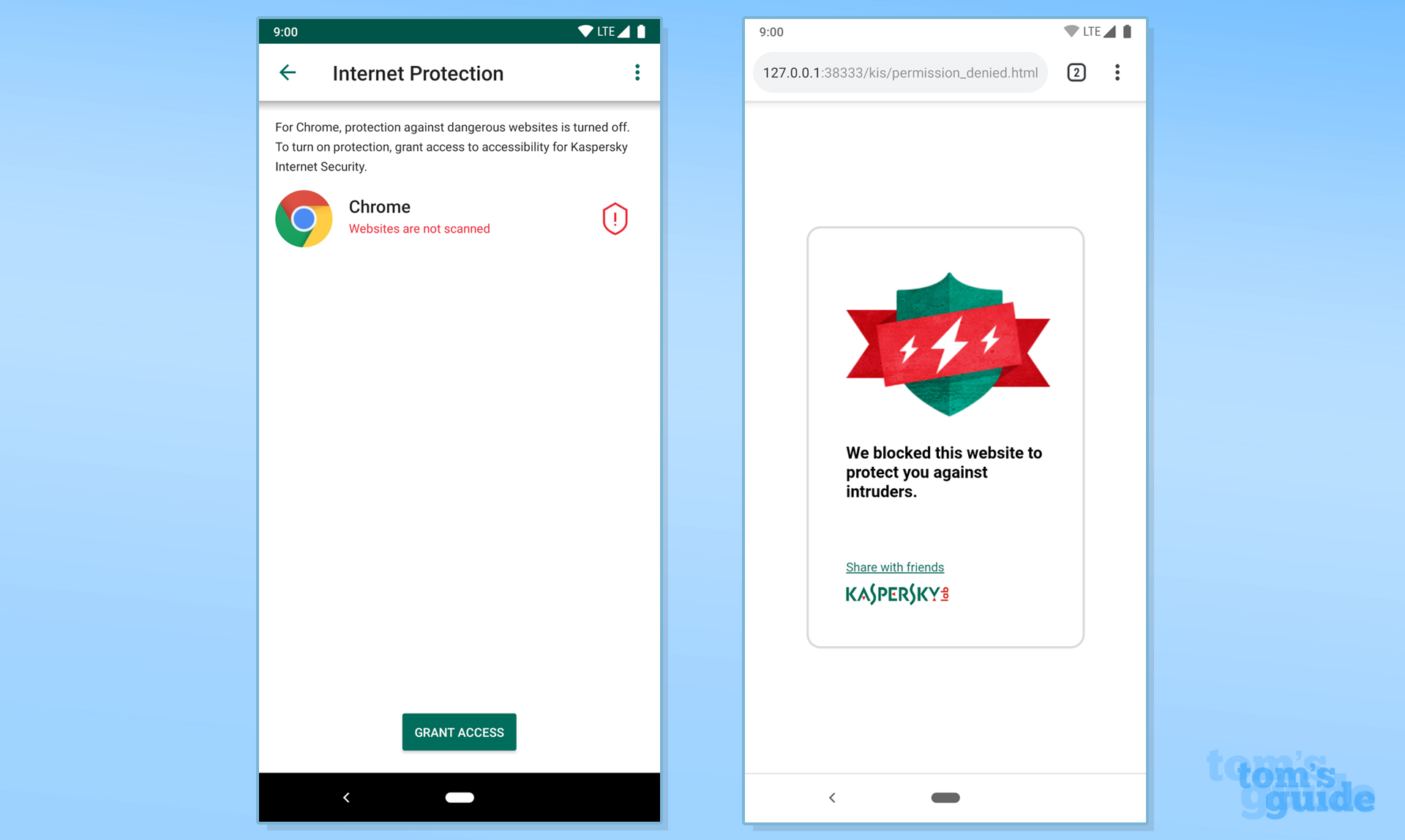
The complimentary version won't automatically scan new apps. Yous have to tap to authorize such scanning each fourth dimension. Still, the software at least noticed when a new app was installed; several of Kaspersky'due south competitors didn't seen to.
Kaspersky's total scan was among the slowest options that I tested on my Google Pixel iii phone, taking approximately 24 to 50 seconds.
Spider web protection is express to the Chrome browser, which must be selected equally the default browser to function properly with the Kaspersky Web Filter. One time this was done, everything worked well and the app reliably blocked the known malicious test sites that I visited.
You can also apply this protection to links opened in apps, but just be sure to toggle this option in the settings for Internet Protection.
Malware detection
Kaspersky was nigh perfect in German independent lab AV-TEST's July 2019 evaluations of Android security products, detecting 99.9% of three,347 "existent-time" Android malware samples encountered online. The program also detected 100% of three,433 "widespread" Android malware samples nerveless by AV-TEST in the previous month.
This puts Kaspersky ahead of the averages among the 20 Android antivirus apps tested in July. It got the same scores in May 2019, and got perfect 100/100 scores in March 2019.
Of the eight other Android antivirus apps I reviewed in 2019, 5 others were submitted to AV-TEST in July 2019. Avast Mobile Security, Bitdefender Mobile Security and Norton Mobile Security each got 100/100 detection results on real-time/widespread samples.
Afterward them came McAfee Mobile Security, matching Kaspersky with 99.9/100. At the distant rear was Google Play Protect, with by far the lowest scores among all apps tested, at 44.1% existent-fourth dimension detection and 54.vii% widespread detection.
More than: Best Antivirus Software and Apps 2019
In each of the 12 bimonthly AV-Test rounds in 2017 and 2018, Kaspersky fell brusk of 100% detection of either real-time malware, widespread malware or both. Real-time detection got as low every bit 99.six%; widespread detection was better, never dipping below 99.viii%.
Over two and a half years of tests, this puts Kaspersky a fleck alee of Avast and McAfee, but behind Bitdefender, which scored a perfect 100/100 most of the time, and Norton, which ever did.
The other ii Android antivirus apps that I reviewed for this round, Qihoo 360 Security and Sentry Security & Antivirus, no longer regularly submit samples to AV-TEST for evaluation.
In in-depth evaluations conducted past Austrian lab AV-Comparatives in July 2019, Kaspersky Cyberspace Security for Android detected 99.ix% of existent-time malware, matching the scores of Avast, Bitdefender and McAfee. Google Play Protect got 83.2%; Lookout, Norton and Qihoo 360 Security were non tested.
Kaspersky's was the only call blocker among the Android antivirus apps I tested that actually worked.
Anti-Theft
Kaspersky has one of the near complete sets of free anti-theft tools in this form, with the power to remotely locate your device, lock information technology, wipe the device, trigger an alarm and even capture a photograph from the front-facing photographic camera. All these commands can exist issued from the my.kaspersky.com web portal and were carried out within 2 to 3 seconds when I activated them.
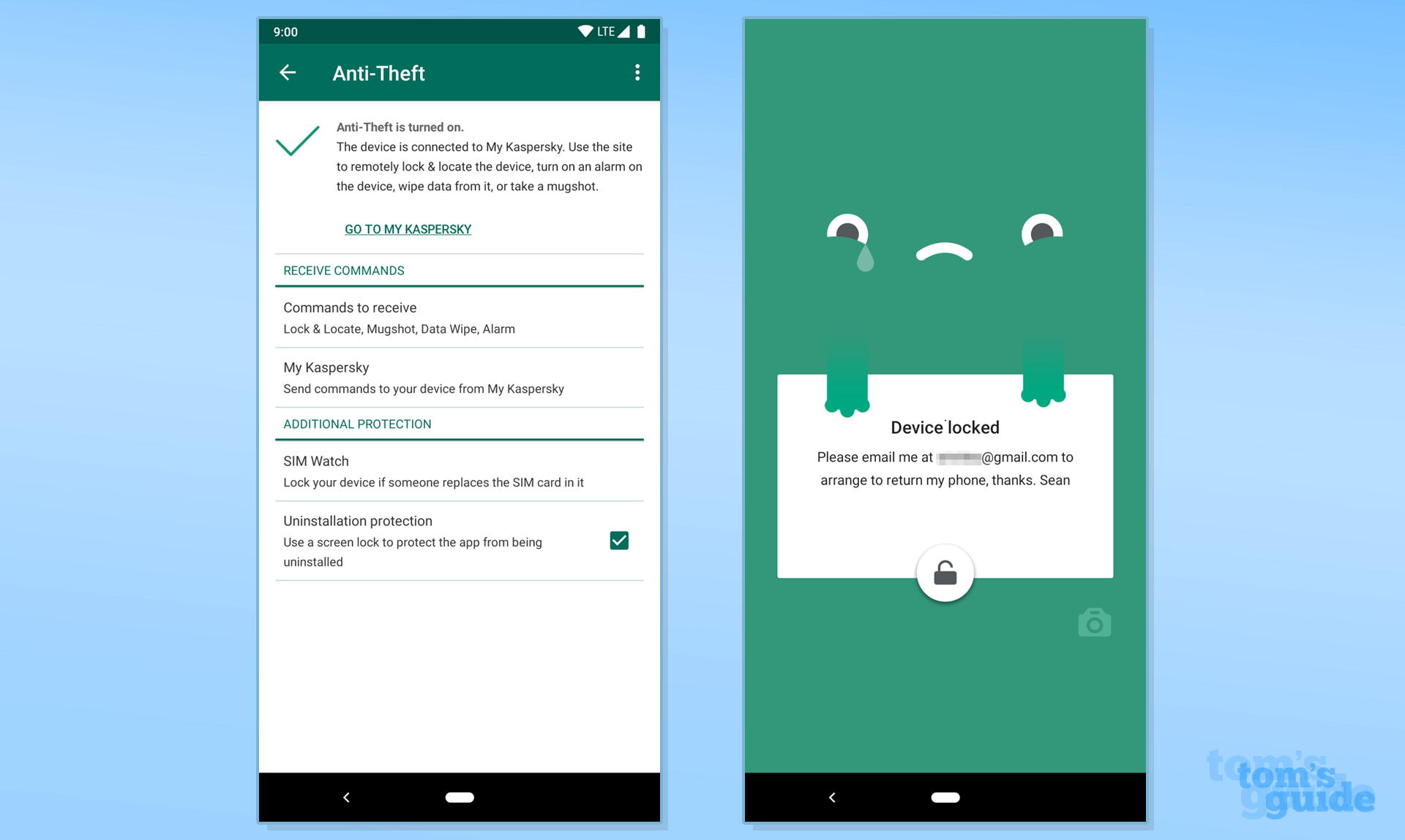
Both the Lock & Locate and Alarm features let you include a brief message on the screen. The web portal also provides a brief status summary about your device. It's a elementary site, merely functional and quick.
Kaspersky also offers a SIM Picket feature that volition lock your device and brandish a predetermined message if someone removes your telephone'south SIM card.
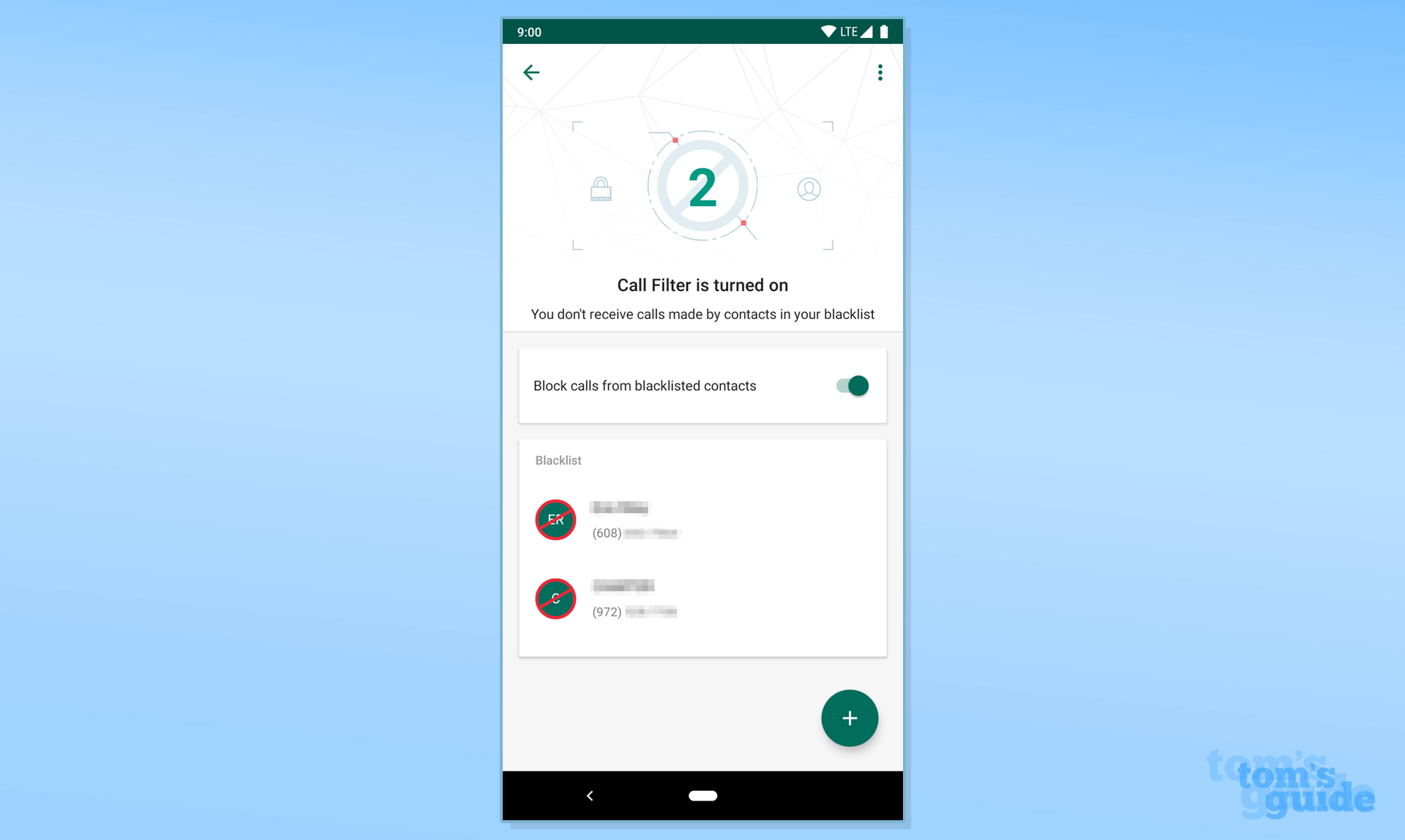
Call Filter
This is a fairly stripped-down feature. You lot tin can add a name, phone number and note for each individual you would like to filter. Y'all can also select people from your contact list, but it would be much more useful to be able to select a number from the recent-call log, every bit presumably you wouldn't typically block an existing contact.
Blocked calls were routed instantly to voicemail, and a notification for the missed call showed up. But this characteristic does not block SMS or MMS messages from blocked numbers. However, it was the simply call blocker amidst the Android antivirus apps I tested that actually worked.
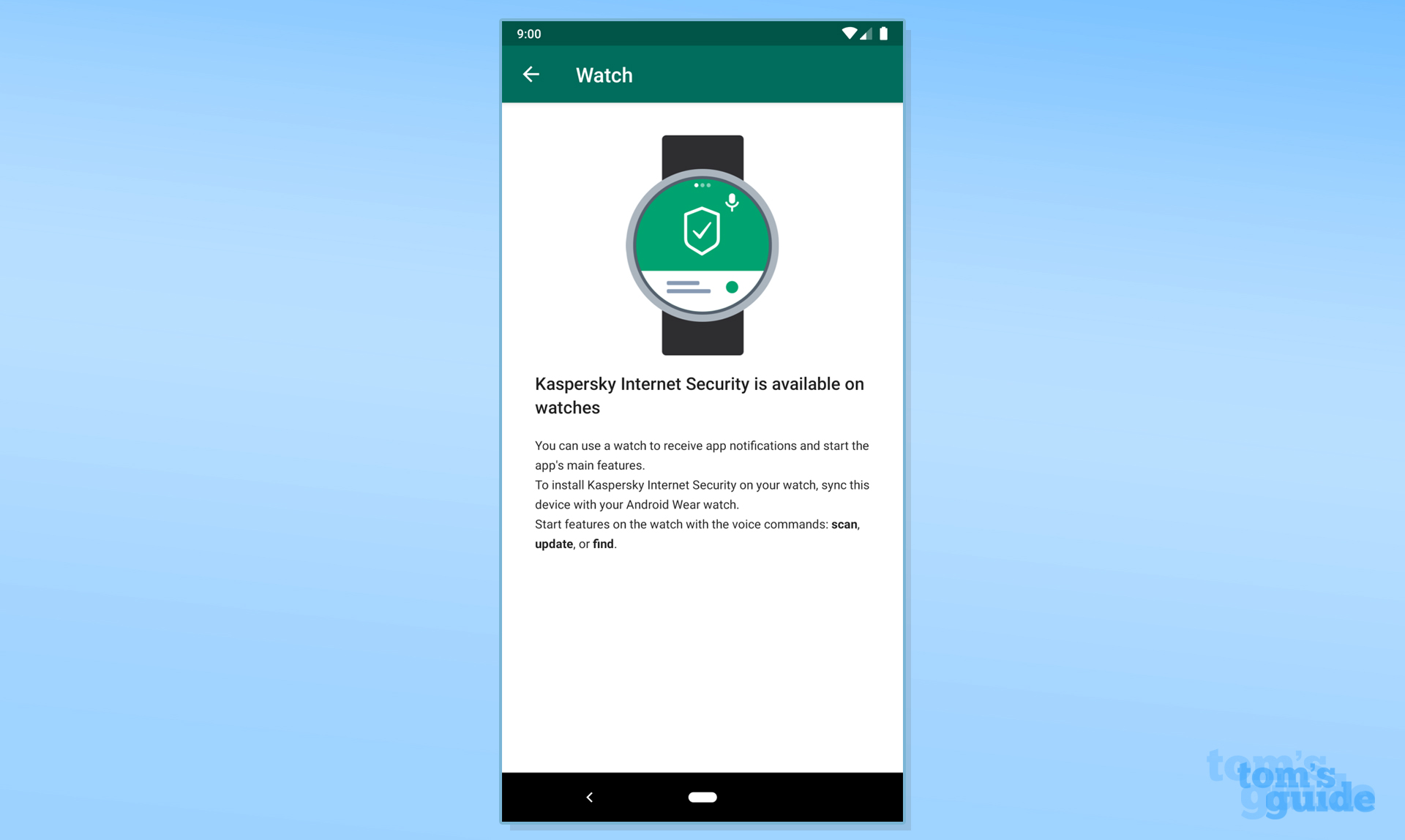
Wear OS
Kaspersky supports triggering a few features on your phone from your Wear Bone smartwatch; you can beginning a scan or update virus definitions. In that location is also a Find My Telephone option that mirrors Article of clothing Os's native Discover My Phone functionality.
App Lock
This lets you lock specific apps if y'all need to share your device with a friend or kid but don't want them accessing everything. You but toggle the apps you would like to lock, which will put them backside the standard swipe, PIN or fingerprint lock yous use for your device.
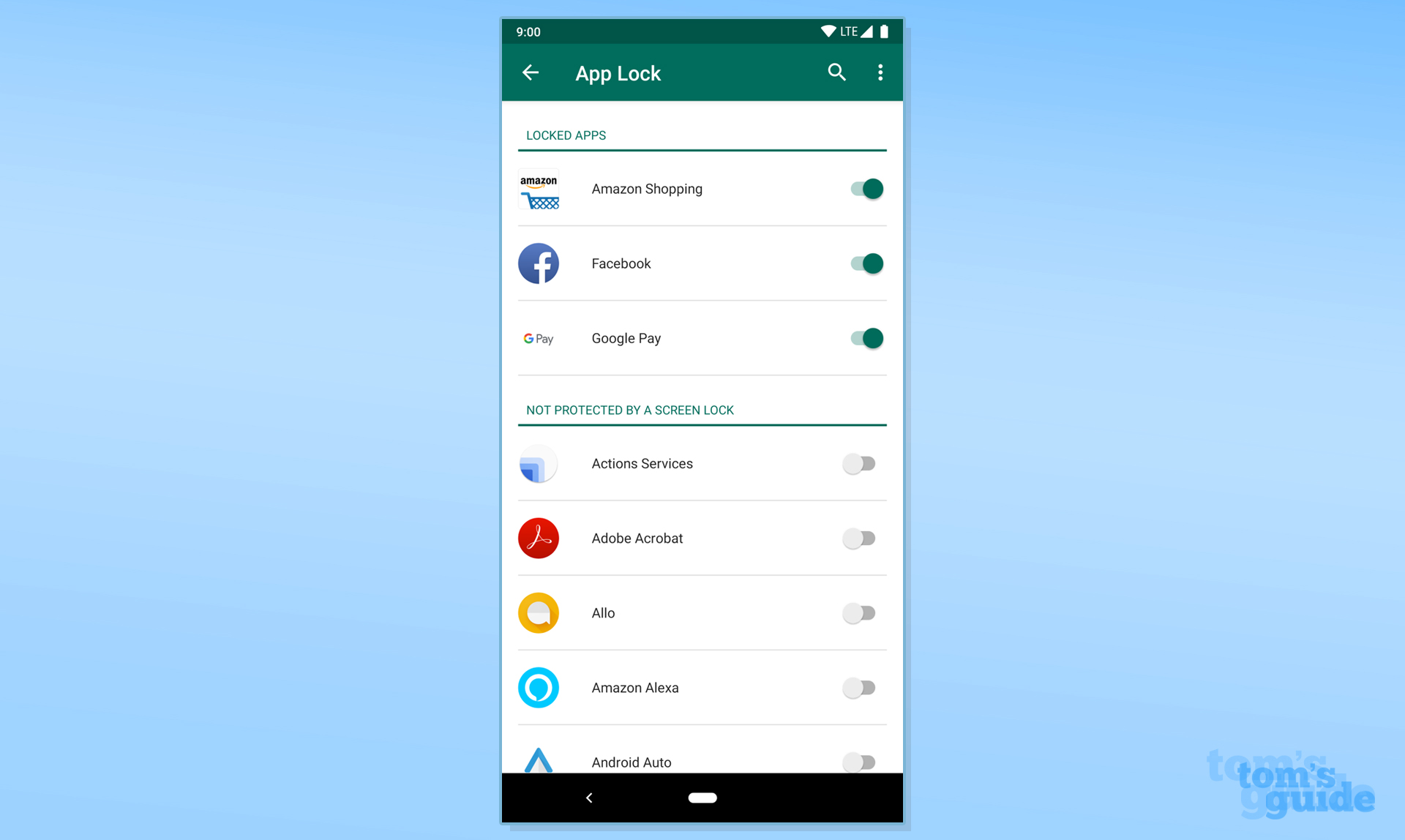
Real-Time Protection
This provides consistent monitoring of your device, with automatic malware scans of new apps and new files as they are installed. By contrast, Kaspersky's free version notices that a new app or file has been installed only prompts to y'all authorize a manual browse instead of going ahead and doing and so automatically. If yous don't tap, information technology doesn't browse.
System impact
To evaluate the bear on of running Kaspersky Mobile Antivirus on my device, I conducted multiple tests using the Geekbench iv Android benchmarking tool on my Google Pixel iii smartphone running Android 9.0 Pie.
I established a baseline performance with no third-party antivirus app installed, then ran boosted tests following installation, and finally more than tests during a full scan with the antivirus app.
Once I installed Kaspersky Mobile Antivirus, my phone actually performed six.8% faster than its baseline boilerplate on Geekbench four. It may be that the app took over certain functions from the Android OS itself and handled them more than efficiently. Nonetheless, during a full Kaspersky malware scan, the phone scored vii.78% beneath its baseline operation.
These results put Kaspersky hands in first place for system impact with the app running in the background. Merely Kaspersky is correct in the middle of the pack during a full scan, coming in fourth among the eight apps that I tested.
Setup and support
Kaspersky does a solid job with training new users. You are guided through the activation of each characteristic, with instructions on which permissions y'all are granting and why. Information technology took me approximately four minutes to get everything up and running.
Kaspersky has a complete complement of back up options, with online chat and phone support available from vii a.m. to ane a.m., Eastern Fourth dimension, 7 days a week, or the option to submit a support request and wait for a response. There'due south besides a knowledge base and an active forum community if you prefer to find your own answers.
Interface
Kaspersky Internet Security has a clean look in its primary screen, merely things get a bit more muddled as yous dig through the app. The overflow menu on the left is nighttime, while the rest of the app is calorie-free and entirely duplicates the menu found on the main screen.
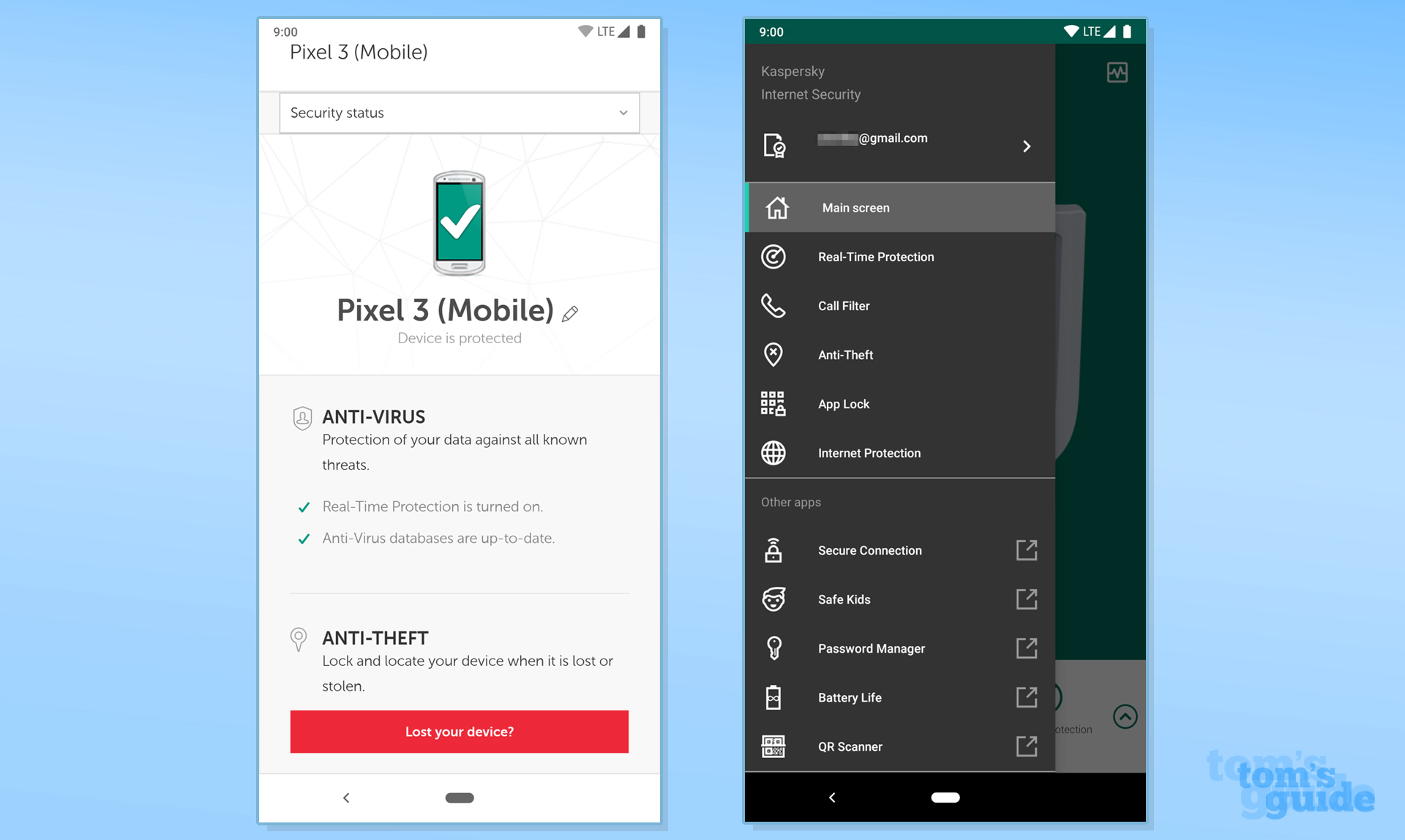
Similarly, the user-interface paradigms seem to shift among the various features, sometimes reflecting Google'southward Fabric Design guidelines and at other times dropping into walls of text with non-obvious affect targets.
Virtually of the problematic screens have to do with settings, and you would non collaborate with them consistently. But the app could utilise an overhaul to bring information technology completely in line with current design standards.
Bottom line
As a pure antivirus solution, there is nothing wrong with Kaspersky Mobile Antivirus, just it'south hard to recommend it over Bitdefender Mobile Security or Norton Mobile Security amid best Android antivirus apps. Compared to those 2, Kaspersky offers slightly lesser malware protection, fewer features overall and a less consequent user interface.
Source: https://www.tomsguide.com/reviews/kaspersky-mobile-security